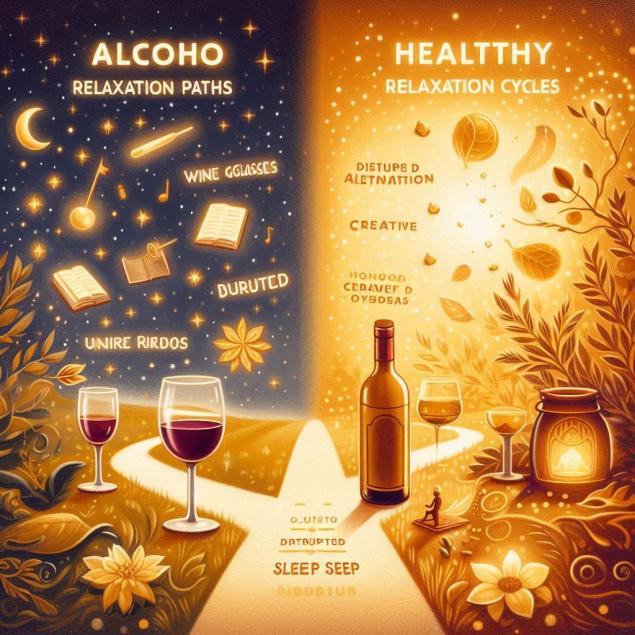284
9 things you should not do on the weekend, if you want to take a break from everyday life

The real rest of the weekend is the art of separation from everyday bustle.
Every Friday we look forward to the weekend, imagining how we can finally relax and recover from a busy week. However, by Sunday evening, many of us feel even more exhausted than we were on Friday. The paradoxical question arises: why does the time devoted to rest not bring the desired recovery?
The answer lies in our weekend habits. Many of them, seemingly productive and even useful, in fact deprive us of the opportunity to relax. Modern neuroscience and rest psychology confirm that the way we spend the weekend directly affects our physical and mental recovery.
1. Don’t plan every minute of the weekend.
The desire to make the most of every minute of free time is understandable, but the overly detailed weekend plan only adds to the stress. Psychologists call this the “scheduled rest paradox” – when the desire to control rest time turns it into another task.
According to a University of Toronto study published in the Journal of Personality and Social Psychology, people who plan their leisure time in detail in advance receive less pleasure from it than those who leave room for spontaneity. This is due to the fact that rigid planning activates the same areas of the brain as work tasks, preventing the activation of the network of passive mode of brain function necessary for proper rest.
Instead of creating a detailed schedule for the weekend, try to identify 1-2 really important things and leave the rest of the time free for spontaneous decisions and the natural flow of the day. This approach will allow your brain to switch from task execution to recovery mode.
2. Give up social commitments that don’t bring joy.
We often agree to social gatherings out of a sense of duty or fear of offending others. However, if these meetings do not bring you joy or energy, they turn into emotional labor, which only exacerbates fatigue.
The concept of a “social battery” explains why some interactions charge us and others drain us. If you feel that certain people or activities are draining your social battery, learn to politely refuse such meetings, especially on weekends.
Practice a conscious approach to social commitment: Before you agree to a meeting, ask yourself the question: “Will this interaction bring me joy or benefit?” If the answer is no, politely refuse or offer to postpone the meeting.
3. Stop “resting” on social media

Digital and real-life recreation activate vastly different neural connections in the brain
The endless scrolling of social media feeds creates the illusion of rest, but actually causes a phenomenon that neuroscientists call “decision exhaustion.” Every post we look at requires a micro-decision—read more, flip through, react—that imperceptibly drains our cognitive energy.
A study conducted by the University of California, Irvine, found that even short periods of social media use activate the same areas of the brain as multitasking at work, which contradicts the very idea of recreation. What’s more, constantly comparing your life to filtered versions of other people’s lives can reduce oxytocin levels and increase cortisol levels, increasing feelings of dissatisfaction.
Instead of endlessly scrolling, set up “digital windows” – strictly limited periods of time to check social media. Use “screen time” features in your smartphone or special apps that block access to social networks after reaching the set limit.
4. Avoid prolonged sleep and sudden regime changes
The temptation to sleep before noon on weekends seems like a natural way to make up for the lack of sleep of the work week. However, research in chronobiology suggests that this behavior only exacerbates problems with circadian rhythms.
When we significantly shift our waking times over the weekend, our bodies experience a jet lag-like condition known as “social jet lag.” This disrupts natural biological cycles, which can lead to poor sleep quality on Sunday night and difficulty waking up on Monday.
A study published in the scientific journal Sleep Medicine found that people who maintain a relatively consistent weekend sleep pattern (with a deviation of no more than 1 hour from their weekday schedule) report higher sleep quality and better health on Monday morning.
The optimal solution is to shift the waking time by no more than 1-1.5 hours compared to working days. If you want to make up for lack of sleep, it is better to go to bed early in the evening than to get up late in the morning.
5. Don’t turn weekends into a marathon of home affairs.
The desire to complete all the accumulated household chores over the weekend is a common mistake. When we fill the weekend with cleaning, laundry, repairs and other responsibilities, we are effectively replacing work stress with household stress, preventing our brains from switching to recovery mode.
The concept of “psychological detachment” in rest psychology emphasizes that true recovery requires not only physical but also mental distancing from tasks and responsibilities. Domestic chores, especially those done in a hurry or on an all-or-nothing basis, do not allow this detachment to be achieved.
Instead of concentrating all household chores on the weekend, try spreading them out into small portions throughout the week. Set a time limit for household chores on weekends—for example, no more than 2-3 hours a day—and stick to it strictly.
6. Avoid information overload
Constant consumption of news, especially negative news, can lead to what psychologists call “compassion fatigue” or “information overload.” This condition is characterized by a decrease in emotional responsiveness and increased anxiety.
A study by the American Psychological Association found that 56 percent of adults who regularly follow the news report a negative impact on their mental health. At the same time, active news consumption on weekends correlates with increased levels of anxiety at the beginning of the work week.
Practice information fasting for at least one day on the weekend – turn off news notifications and refrain from checking news sites. Instead of passively consuming information, choose active forms of leisure that capture your attention.
7. Do not use alcohol as the main way to relax.

Full rest activates the natural mechanisms of relaxation of our body
Many people perceive alcohol as a way to quickly switch from work mode on the weekend. However, this illusory relaxation has a downside - even moderate alcohol consumption disrupts sleep architecture, reducing its restorative function.
Neurobiological studies show that alcohol suppresses REM sleep, which is especially important for cognitive recovery and emotional regulation. Even one evening with moderate alcohol consumption can reduce sleep quality by 30%, equivalent to losing about 2 hours of restorative sleep.
Instead of using alcohol for relaxation, explore alternative switching techniques – for example, short intense physical activity, contrast showers, meditation, or deep breathing practices create a natural transition from a working state to rest without disrupting the quality of recovery processes.
8. Don’t take work home for the weekend.
The blurring of the boundaries between work and personal time is one of the most common problems of the modern world. Checking your work mail or “quickly” completing tasks on weekends significantly reduces the quality of rest, even if it takes only a few minutes.
The concept of “mental contamination” in work psychology describes how even brief episodes of work thoughts or actions in personal time can “infect” an entire period of rest. When we think about working on weekends, we activate stress-related neural networks that interfere with recovery.
Set clear technological boundaries for the weekend: disable notifications from work mail and instant messengers, or even uninstall related apps during the weekend. If you still have to complete work tasks, allocate a strictly limited time block for this, after which you completely switch to rest.
9. Stop engaging in endless procrastinational TV shows
Watching TV shows for hours (known as binge-watching or binge-watching) seems like the perfect way to relax, but can actually lead to what psychologists call "recreational exhaustion" - where passive rest does not bring the expected recovery.
Studies show that watching more than 2-3 episodes of the series in a row is often accompanied by a decrease in the quality of sleep, as well as feelings of emptiness and dissatisfaction. This effect is amplified if the series has a tense or dramatic plot, as it maintains elevated cortisol levels, which is contrary to the purpose of recreation.
Instead of endless browsing, practice conscious content consumption: choose what you want to watch in advance, limit viewing time, and alternate passive content consumption with active forms of leisure. Include weekend activities that require your active participation – creativity, physical activity, communication or learning new skills.
A real weekend vacation is an art that can and should be learned. By giving up habits that masquerade as rest but actually drain us, we open the door to a deeper recovery. It is important to remember that the quality of a holiday is not measured by the amount of work done or content consumed.
Research on neuroscience and rest psychology shows that a full recovery requires a balance between activity and relaxation, social interaction and solitude, structure and spontaneity. Weekends are not just a break between work weeks, but a valuable opportunity to restore physical and mental resources that are depleted during work.
By adopting a mindful approach to organizing weekends and abandoning the habits described above, you can turn two days off into an effective tool for maintaining a long-term balance between work and rest.
Glossary of terms
The Passive Mode Network (Default Mode Network)
A system of interconnected brain regions that is activated when a person is not focused on the outside world and is in a state of internal reflection, daydreaming, or resting quietly. It plays a key role in brain repair.
Psychological detachment
A psychological mechanism in which a person mentally distances himself from work or stressful situations. It is a necessary condition for the full restoration of the nervous system.
Social jetlag
The discrepancy between a person’s biological circadian rhythms and his social schedule is especially noticeable with a sharp change in sleep patterns on weekends compared to working days.
Compassion fatigue
A state of emotional and physical exhaustion resulting from constant exposure to traumatic or negative information, often related to news of crises, disasters, and the suffering of others.
Depletion of solutions
A cognitive state in which a person’s ability to make decisions deteriorates after a long period of decision-making. This is especially true when using social networks that require constant micro-solutions.
Mental contamination
The process in which thoughts about work or other responsibilities contaminate rest time, preventing full recovery of the nervous system and psychological regeneration.
Recreational attrition
The paradoxical state that occurs in passive forms of rest, when activities intended for recovery actually lead to additional depletion of physical and psychological resources.
Oxytocin
A hormone and neurotransmitter associated with social connections, trust, and stress reduction. It is often called the “hug hormone” because of its role in bonding.
cortisol
The main stress hormone produced by the adrenal glands. Chronic increases in cortisol levels are associated with a variety of negative health effects, including sleep disturbances, decreased immunity, and cognitive impairment.
8 Reasons Why You Should Evaluate Yourself By Effort, Not Results
10 Signs You've Made Misfortune Your Habit























